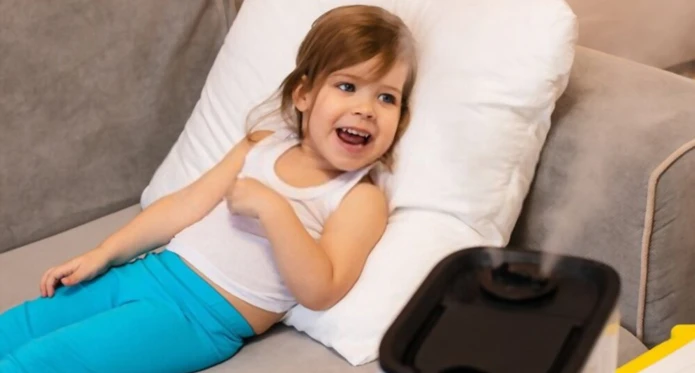Last Updated on March 8, 2023
There’s nothing quite like the smell of a freshly scented home, but if you have small children, you always prioritize safety over comfort.
For many parents, the arrival of a new baby is accompanied by a flurry of activity as they set about creating a safe and comfortable home for their child. Among the many products that are often used to create a welcoming environment is an air freshener. Naturally, some parents might wonder: is air freshener safe for babies?
This article is dedicated to finding a definitive answer to your question and showcasing our options to protect our kids from harmful chemicals.
Side-Effects of Air Freshener for Babies:
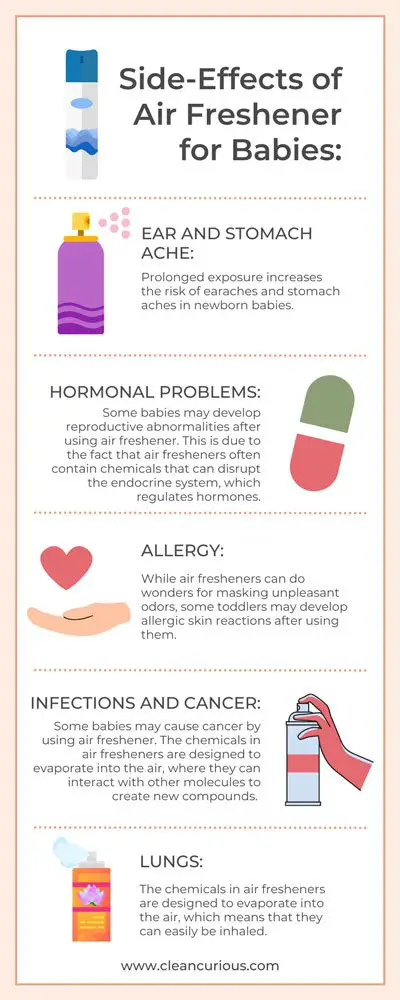
Ear and Stomach Ache:
Prolonged exposure increases the risk of earaches and stomach aches in newborn babies. A study found that babies who were frequently exposed to aerosols were one fifth more likely to suffer from stomach disorders, diarrhea and cramps.
Hormonal Problems:
Some babies may develop reproductive abnormalities after using air freshener. This is due to the fact that air fresheners often contain chemicals that can disrupt the endocrine system, which regulates hormones. When the endocrine system is disrupted, it can lead to a variety of problems, including infertility and birth defects.
Allergy:
While air fresheners can do wonders for masking unpleasant odors, some toddlers may develop allergic skin reactions after using them. These reactions typically manifest as a rash, which can range from mildly irritating to extremely painful. In severe cases, the rash may even blister or bleed. If left untreated, it could lead to more serious problems, such as infection.
Infections and Cancer:
Some babies may cause cancer by using air freshener. The chemicals in air fresheners are designed to evaporate into the air, where they can interact with other molecules to create new compounds.
When these chemical reactions take place inside a closed container, like an aerosol can, they can produce high concentrations of VOCs (volatile organic compounds).
Studies have shown that exposure to VOCs can increase the risk of developing cancer, and infants are particularly vulnerable because their bodies are still developing.
Lungs:
The chemicals in air fresheners are designed to evaporate into the air, which means that they can easily be inhaled. For adults, this is generally not a problem, but for young children, whose lungs are still developing, it can lead to serious respiratory problems. In some cases, it has even been linked to asthma and other respiratory illnesses.
What Are the In-general Risks of Air Fresheners?
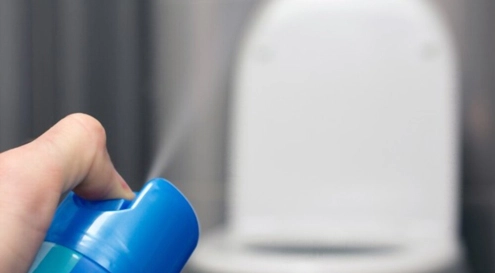
Most people are aware of the dangers of inhaling too much second-hand smoke, but did you know that air fresheners can be just as harmful? A study published in the journal Indoor Air found that certain types of air fresheners can release pollutants that are linked to a range of health problems, including respiratory irritation and asthma.
Aside from this, some air fresheners contain chemicals that can interact with other pollutants in the air to produce more dangerous compounds. For example, a common air freshener ingredient known as 1,4-dichlorobenzene has been shown to react with ozone to form potentially carcinogenic compounds.
Many common air fresheners contain some volatile organic compounds (VOC), which can be harmful to young children. VOCs are released into the air as the fragrance evaporates, and they can cause a variety of health problems, including respiratory irritation, headaches, and dizziness.
Some air fresheners also contain phthalates, which are linked to hormone disruption and reproductive toxicity. So next time you reach for that air freshener, think twice about the potential risks. Your nose will thank you for it.
What Happens if You Inhale Too Much Air Freshener?
Inhaling air fresheners can cause a number of short- and long-term health effects, including headaches, nausea, dizziness, and difficulty breathing. If you have asthma or other respiratory conditions, inhaling air fresheners can trigger an attack or make your symptoms worse.
In extreme cases, inhaling large amounts of air freshener can lead to unconsciousness and extreme health complications.
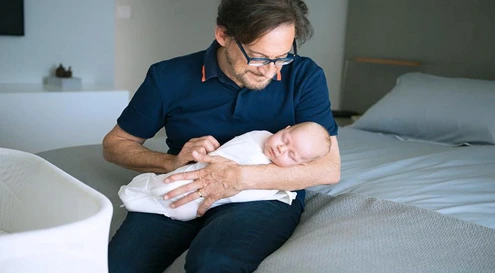
Generally speaking, air fresheners are safe when used as directed. Nevertheless, users should take precautions when using products containing chemicals. Fragrance-free options are always the best choice for babies, as their lungs are still developing and they are more susceptible to irritants.
It is especially important not to use air fresheners around your baby if your family has a history of allergy or asthma. If you do use air fresheners, make sure to keep them out of your baby’s reach and choose products with natural ingredients that are less likely to cause irritation.
Are Plug-in Air Fresheners Safe for Babies?
Plug-in air fresheners work by heating a scented oil to release fragrance into the air. Some of the compounds in these oils can be harmful if inhaled, particularly for young children whose bodies are still developing. If placed too close to flammable materials, the device’s heat can also pose a danger.
As a result, it’s important to use caution when using plug-in air fresheners in homes with young children. There are some steps you can take to minimize the risk associated with these devices.
First, choose an air freshener that uses natural oils rather than synthetic fragrances. Second, make sure the device is placed far away from children and away from any flammable materials. Lastly, don’t use the device more often than necessary – a little goes a long way!
Can I Wear Perfume Around My Baby?
It’s perfectly safe to wear perfume around your baby. In fact, it might even be beneficial. Babies have very sensitive noses and can easily be overwhelmed by strong odors. Wearing a light scent can help to mask other smells that might bother them.
Perfume can also increase your sense of calm and relaxation, which can benefit both of you. Just be sure to avoid using any perfumes that contain harsh chemicals or allergens. If you’re unsure about a particular product, it’s always best to consult with your doctor before using it.
Is it Safe To Use Scented Candles for Babies?
As any parent knows, babies are delicate creatures that need to be protected from harm. This is why it’s important to choose safe candles when lighting a room for a baby. Ever since the early days of scented candles, there have been concerns about their safety.
Scent candles are not more likely to cause harm than unscented candles, according to recent studies. The key is to choose candles made from natural materials like beeswax or soy wax. These types of candles don’t release harmful chemicals into the air when they’re burned.
As a precaution, keep candles out of reach of children and always extinguish them when you leave the room. Taking these simple precautions allows you to enjoy a candle’s calming scent without putting your baby at risk.
In the Case that I Cannot Use Air Freshener, How Can I Make My House Smell Good With a Newborn?
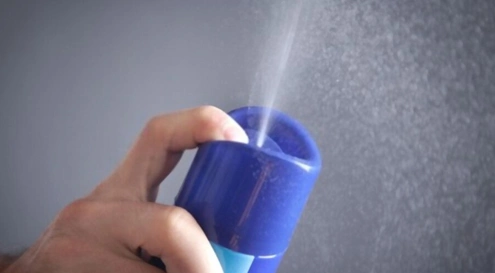
One of the most important things you can do is to keep up with your laundry. Newborns go through a lot of diapers, and all that laundry can quickly start to pile up. If you’re not able to do all the laundry right away, be sure to put dirty clothes in a hamper with a lid to prevent them from starting to smell.
You should also regularly wash bedding and towels, as these can also hold onto strong odors. Aside from that, keep your home’s surfaces clean and dust-free.
Regularly vacuum carpets and floors and dust surfaces with a microfiber cloth. These simple steps will help to keep your home smelling clean and fresh, even with a newborn in the house.
What Scents Are Safe for Babies?
There are a few scents that are considered safe for babies. These include lavender, chamomile, and vanilla. Each of these scents has calming properties that can help to soothe and relax a baby.
These scents are also gentle enough not to irritate a baby’s skin or cause any adverse reactions. If you are looking for a scent that is safe for your baby, essential oils are a great option.
You can add a few drops of lavender oil to your child’s bathwater or diffusion chamomile oil in their nursery. As long as you use only a small amount of oil, these scents will be gentle and safe for your baby.
Is Inhaling Febreze Safe?
Febreeze is a popular household air freshener that is sprayed directly into the air. The main active ingredient in Febreze is cyclopentane, which is a chemical that evaporates quickly.
When cyclopentane is inhaled, it quickly enters the bloodstream and is distributed throughout the body. Some studies have raised concerns about the health effects of inhaling cyclopentane, but the overall evidence suggests that it is safe for most people.
Inhaling small amounts of cyclopentane is not likely to cause any serious health problems, but it is always important to follow the directions on the Febreeze bottle and avoid inhaling too much at once.
So, Should We Use Air Fresheners Around Babies or Not?
Many air fresheners are formulated with compounds that can irritate a baby’s delicate skin and respiratory system. In some cases, these chemicals can even cause serious health problems. For this reason, it is important to exercise caution when using air fresheners around babies.
If possible, try to avoid using them altogether in areas where your child spends time. Choose fragrance-free options whenever possible and avoid using them in your baby’s sleeping area.
If you must use an air freshener, be sure to choose one that is specifically designed for use around children. By taking these precautions, you can help ensure that your child remains safe and healthy.
You Can Also Read:
- Why Is It Important to Remove Air Freshener Stains?
- How Much Electricity Do Plug-In Air Fresheners Use?
- Are your closet clothes stale and stinky?

